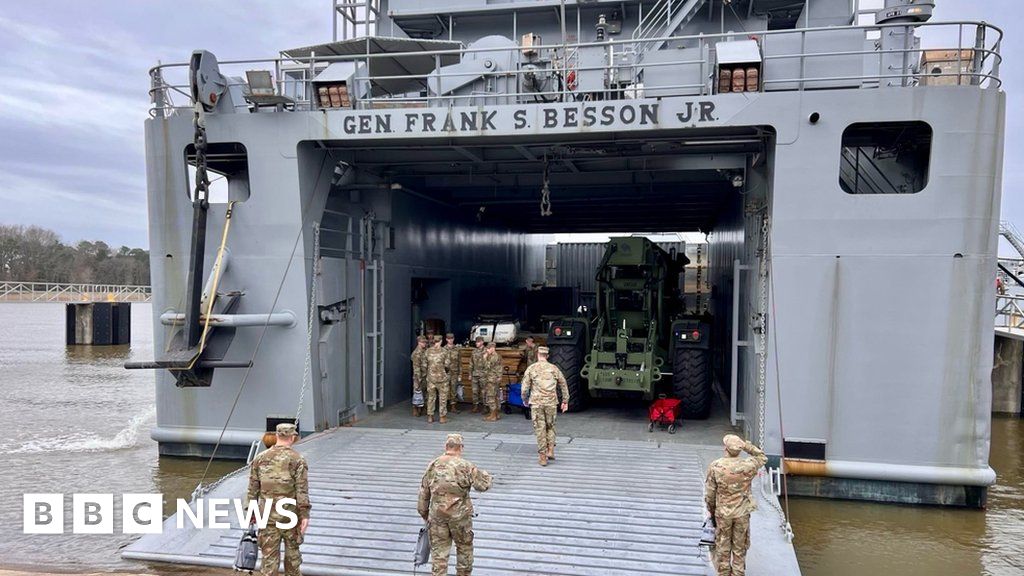- By Tiffany Wertheimer
- BBC News
Image source, US Central Command
The General Frank S Besson is carrying the first load of equipment to build a floating harbour
A US military ship is sailing towards the Middle East, carrying equipment to build a temporary pier off the coast of Gaza, the army says.
The support ship, General Frank S Besson, set sail from a military base in the state of Virginia on Saturday.
It comes after President Joe Biden said the US would build the floating harbour to help get aid into Gaza by sea.
The UN has warned that famine in the Gaza Strip is “almost inevitable” and children are starving to death.
Aid deliveries by land and air have proved difficult and dangerous.
The US ship departed “less than 36 hours” after Mr Biden made his announcement, US Central Command wrote on X.
It is “carrying the first equipment to establish a temporary pier to deliver vital humanitarian supplies” to Gaza, the statement continued.
The Pentagon has said it could take up to 60 days to build the pier with the help of 1,000 troops – none of whom would go ashore.
Charities have said those suffering in Gaza cannot wait that long.
It is hoped the vessel, Open Arms, will be able to depart before Monday, following an EU announcement that a new sea route would be opened over the weekend to allow aid to sail directly from Cyprus – the closest EU country to Gaza.
Image source, WORLD CENTRAL KITCHEN/OPEN ARMS
The Open Arms aid ship has been ready to depart for weeks, the charity’s founder has said
The ship belongs to the Spanish charity of the same name, Open Arms, and the food on board has been provided by US charity World Central Kitchen.
It is unclear how any aid delivered by sea would get safely to shore before the US pier is built. Gaza has no functioning port and its surrounding waters are too shallow for large vessels.
However Oscar Camps, the founder of Open Arms, told the Associated Press that at the destination point – which remains a secret – a team from the World Central Kitchen has been building a pier to receive the aid.
Israel has welcomed the ocean initiative, and said aid would be delivered after security checks were carried out in Cyprus “in accordance with Israeli standards”.
Israel’s military launched an air and ground campaign in the Gaza Strip after Hamas’s attacks on Israel on 7 October, in which about 1,200 people were killed and 253 others were taken hostage.
More than 30,900 people have been killed in Gaza since then, the territory’s Hamas-run health ministry says.
The conflict has created a growing humanitarian crisis, and the UN has warned that at least 576,000 people across the Gaza Strip – one quarter of the population – are facing catastrophic levels of food insecurity.
Western countries have pressed Israel to expand land deliveries by facilitating more routes and opening additional crossings.
Lorries have been entering the south of Gaza through the Egyptian-controlled Rafah crossing and the Israeli-controlled Kerem Shalom crossing. But the north, which was the focus of the first phase of the Israeli ground offensive, has been largely cut off from assistance in recent months.
An estimated 300,000 Palestinians are living there with little food or clean water.
Israel has been accused of hampering aid efforts, and an independent UN expert last week accused it of mounting “a starvation campaign against the Palestinian people in Gaza”.
Yeela Cytrin, a legal adviser at the Israeli mission to the UN, responded that “Israel utterly rejects allegations that it is using starvation as a tool of war”, before walking out in protest.

Emily Foster is a globe-trotting journalist based in the UK. Her articles offer readers a global perspective on international events, exploring complex geopolitical issues and providing a nuanced view of the world’s most pressing challenges.








